- Home
- Franklin W. Dixon
Secret of the Red Arrow Page 3
Secret of the Red Arrow Read online
Page 3
Principal Gorse sighed. “Sometimes, boys,” he said, “I think the world is changing too fast for me. Can either of you explain the appeal of that movie to me? Watching people get scared out of their minds for no real purpose?” He shook his head and shrugged.
“I think it’s about shock, sir,” I said. “In this day and age we’ve been desensitized to trauma, crime, horrific happenings. It takes more and more to shock your audience. Look at movies like Saw or Hostel—they go much further than the classic Hitchcockian horror of the past.”
Principal Gorse nodded, looking bemused.
“So the natural next step,” I went on, “the final frontier, if you will, is real emotion. Instead of trying to shock his audience, Seth is allowing them to share in the real shock of his unknowing participants.”
Principal Gorse blinked. He was a nice guy, really; dressed like he always was, in a slouchy cardigan sweater, along with his usual corduroy pants and brown shoes. He had a kindly face with sort of messy brown hair and glasses. He looked like—well, like a kind of hippieish high school principal. A youngish man, maybe only forty years old, except that he also walked with a fancy hand-carved cane, which was the result of a bad skiing accident five years earlier.
You would probably have been able to pick out Mr. Gorse’s car in the teachers’ parking lot just by looking at him: It was an orange 1970s Karmann Ghia. Pure beatnik. Even its engine—it made a singular put-put-put sound—reminded you of him, so that wherever you were in Bayport, if he was passing anywhere within earshot, you were aware of him through that unique put-put-put. There goes Mr. Gorse, you would say to yourself.
We considered Mr. Gorse a friend—he’d been my band teacher in middle school. I knew he liked us. He’d been really nice to Frank and me when the Deal was being negotiated. Now he tilted his head, giving us both a concerned look.
“How are things going, Hardy Boys?” he asked. “I understand the legal problems you boys have had this past year. As a matter of fact, I received a note from the state board of education about you both.”
Joe and I shifted uncomfortably in our chairs.
Mr. Gorse opened the letter and started reading. “Apparently, I’m to understand that—as part of a plea agreement with the state attorney general—you are both subject to ‘instant recourse.’ ” He looked up at us. “I guess that’s a little bit like probation.” He continued reading. “Which, if you are found to engage in any kind of ‘independent amateur law-enforcement-type activities,’ will result in the pair of you being sent to”—here he brought the letter close to his eyes—“the J’Adoube School for Behavior Modification Therapy on Rock Island.”
He wasn’t telling us anything we didn’t know. But it was not pleasant to hear it spoken out loud. “Are you meeting regularly with your legal adviser?” he asked.
Joe and I nodded. Our lawyer was Uncle Ben—Ben Hardy, our dad’s brother—a Hartford tax attorney who had been given the thankless job of dealing with all the legal problems we’d accrued in the past year.
“Good. Well, what I wanted to say to you was that all this stuff . . .” He waved at the letter. “It doesn’t change anything as far as I’m concerned. The world needs fighters, boys. People with the courage to stand up for what’s right. But you can’t accomplish your goals if you’re locked up in juvenile hall or if your transcripts show half a dozen suspensions. Am I right?”
We nodded.
“Just remember, I’m in your corner. And my door is open, day and night.”
Just then, his door actually opened.
“Oh, I’m sorry,” a woman said. It was Yukiko Collins, one of the school’s art teachers.
Mr. Gorse brightened. It was rumored that he and Ms. Collins were dating. Nobody wanted to pry, on account of Mr. Gorse being a widower. (His wife had died in the skiing accident that had broken his leg.) But Joe and I liked the idea of Mr. G and Ms. C being an item, because they were our two favorite people at Bayport High.
“That’s all right, Ms. Collins,” Mr. Gorse said, rising to his feet, a smile on his face. “We were finished here.”
As we passed outside, Ms. Collins smiled. She always wore crazy, mismatched clothing with horizontal stripes, and men’s hats, and today was no exception.
Everybody loved Ms. Collins. She was one of those teachers who had the knack for always making you feel enthused and entertained. Joe and I had our own reasons for loving her: She had written the recommendation letter that kept us from being sent to the reform school Mr. Gorse had mentioned: J’Adoube—a really notorious place on a tiny, isolated island twenty miles out to sea. All kinds of rumors existed about the place. Rumors about strange “behavior modification therapies” with names like “Swarm” and “Funhouse Mirror.” It was also rumored that several kids died each year trying to escape.
Today Ms. Collins seemed troubled. “I hope you boys are careful about talking on your cell phones,” she said.
Smiling at this haphazard warning, I said, “You don’t believe that stuff about their causing brain cancer, do you, Ms. Collins?”
“No, but I think mine’s been hacked or something. . . .”
That sounded odd. I wanted to ask her more about it. But Mr. Gorse invited her in. She said good-bye to us with that same uneasy air, and the door shut behind them.
In the lobby, Principal Gorse’s secretary, Connie, smiled and held up two green late passes. “How’s Trudy, boys?”
Connie knew Aunt Trudy from their gardening club. Together, they’d helped make an untended plot in back of the school into an overflowing vegetable garden. The cafeteria even used the fresh veggies in its daily special. (Not that you could tell, really. If only Aunt Trudy would teach some cooking classes down there!)
“She’s good,” Frank said with a smile. “We’ll tell her you say hi.”
Connie nodded. “I’d appreciate that. Have a good day, boys.”
• • •
I’m not sure Connie needed to bother with the late passes. Frank and I both had study hall in the cafeteria next with Coach Gerther, who barely glanced at the passes before grabbing them out of our hands and gesturing vaguely at the rows of tables. “Take a seat.”
Coach Gerther was rumored to have lost 80 percent of his hearing in the Vietnam War, which made him the perfect teacher for study hall. The din regularly reached rock-concert levels. It was literally impossible to get any work done in there, unless your “work” involved studying the effects of loud noises on hearing over time. Frank and I settled at a table in the back, and Frank pulled out a notebook.
“So . . .,” he began. “About the speech . . .”
“Yo—Hardy boys!”
I looked up to see Sharelle Bunyan standing over us. Well, looming over us was more like it. She was the queen of pep. Although she was an old friend of mine from junior high, we’d drifted apart in high school. She was very popular (not that we were unpopular—but she was definitely in the alpha group).
It was actually nice to see her. She had the same red curly hair she’d had as a kid, only now she wore her cheerleader uniform, with the Bayport High colors of green and gold and the school mascot—Bill the Bulldog—pictured snarling on the front.
“Hey, Sharelle. Long time no see. What’s up?”
“I was hoping,” she said, “that you guys would be able to volunteer for the blood drive.” She sat down next to us. As she did, she accidentally dropped a clipboard she was carrying. It clattered to the floor. “Shoot!” She picked it up and dusted it off, then held it out under our noses. Apparently, we had no choice but to sign up. “Ball of energy” is how people used to describe her in junior high. I saw that the description was still applicable.
“Um, sure, Sharelle.”
“Yeah, we’re always happy to bleed for a good cause.”
We were starting to add our names to the list when she spoke to us under her breath. As she did, her whole demeanor changed. She sounded panicky.
“Look, guys—I need your help,” she w
hispered. Something about her mood was contagious. We lowered our voices to match hers and kept our heads down.
“What kind of help?” Frank asked.
“You know . . . with a mystery.”
A mystery. There it was. You have no idea how a reputation as a teenage detective can complicate your life. Frank started to answer, but I gave him a nudge. He picked up on my wariness and stayed silent. The truth was, although it sounded harmless and kind of fun, this wasn’t an innocent topic for us anymore. There were serious consequences for us involved with anything remotely connected to sleuthing. Consequences that Frank and I didn’t talk about, because . . . well, we didn’t like to think about them. Not that they would stop us. But we still had to be more careful now than we used to be.
“Why ask us?” I said cautiously.
“Oh, come on,” Sharelle said. “Don’t give me that. Everybody knows you guys are, like, Sherlock Squared. You’re both packing heat, right?”
“Don’t believe everything you hear, Sharelle.”
“Well, anyway—I need help. Or . . . well, Neal needs help.” She was the only person in school who did not refer to her older brother as Neanderthal Bunyan—yes, the same charming fellow who’d introduced Frank to his impending Internet fame this morning. He was also the star linebacker of the BHS football team.
“Is he all right? Did something happen to him?”
“Yes. He’s . . . fine, more or less. Physically at least. But . . .”
She glanced around the hall. Clearly, she was uneasy discussing this out in the open. “Look, I’m going to ask for a bathroom pass. Can you guys follow me, and we can talk about it out by the vending machines?” It would be quieter there. Apparently, the blood drive had been a cover story to make contact with us.
She got up to lead us out of the cafeteria. I was cautious but curious. I started to follow her, but Frank said, “We’ll meet you there in five.”
Sharelle seemed puzzled. She looked like she wanted to say something, but instead she just nodded and walked off.
Frank watched her go up to Coach Gerther, get her pass, and head out the door. Then he turned to me, his expression dark. “Neanderthal Bunyan—asking us for help,” he said. “That doesn’t seem odd to you?”
The truth was, it did.
It was six or seven months ago—before we had to retire. Joe and I had tracked down a drug ring. What we didn’t know or anticipate was the series of busts around town that would follow—the consequences of our investigation, including the arrest of the former star linebacker for the Bayport High School football team, Neal “Neanderthal” Bunyan, all-state three years running, who had apparently been abusing steroids.
Neanderthal Bunyan had good reason to enjoy seeing Frank and me humiliated. Would he even accept our help?
“Let’s just be careful,” Frank suggested.
It might be a challenge, in some classes, for two brothers to get bathroom passes for simultaneous bathroom trips. But fortunately, Coach Gerther had stopped caring a long time ago, possibly before we were born. He grabbed two passes from a big coffee can he kept on his desk and waved us away.
We found Sharelle waiting where she said she’d be, by the vending machines. Frank and I took a seat on either side of her.
“So what’s going on with Neanderthal?” I said.
“Okay,” she said in an excited whisper. “This, like, totally insane thing has been happening. . . .”
MONITORED
5
FRANK
I’M NOT SURE WHO WAS THE LEAST COMFORT-able when Sharelle led Joe and me into Neanderthal Bunyan’s bedroom that afternoon. Neanderthal was lying back on his bed, all his attention focused on the football-themed video game he was playing on the TV that hung on the wall.
“Get out, Sharelle,” he said without looking up, but when three people walked in, and not one, he sighed, hit a pause button, and looked up.
“Oh,” he said, looking startled and not pleased. “It’s—”
“You need help, Neal,” Sharelle said in a bossy voice. I had a sudden premonition of what it might feel like to have Sharelle as a sister, and a chill ran down my spine. “I asked these guys to come over because I knew you never would.”
Neanderthal didn’t say anything. He was staring from me to Joe with a curled lip, like he smelled something horrible. “I don’t need any help from these two,” he said, and picked up the game controller again. He unpaused the game and turned his attention back to the screen. “You can show yourselves out,” he finished.
Fair enough. I touched Joe’s arm and started heading for the door. We weren’t supposed to be doing any investigation right now . . . so why waste time trying to convince a guy who didn’t even want our help? But Joe seemed to hesitate, looking to Sharelle. Suddenly she jumped forward, grabbing the controller from her brother’s hand.
“HEY!” Neanderthal yelled.
“HEY YOURSELF!” she shouted back, matching him on volume. She gestured to me and Joe. “I asked these guys to come over today because even though you don’t have the best history, they’re the only ones who can help you,” Sharelle finished.
Neanderthal pursed his lips. Clearly, he didn’t like the direction of this conversation. But I could tell that Sharelle’s words were making a dent. He let out a groan and looked down at his New York Giants comforter. Then he crossed his arms and settled back against the head of his bed, still scowling, still not looking at us.
“Do you want to tell them what happened?” Sharelle asked, moving closer to the bed.
Neanderthal shook his head. “You tell them,” he muttered.
Sharelle turned back to face Joe and me. “Okay,” she said. “About a week ago, Neal started getting some very weird e-mails.”
I nodded slowly. “Weirder than the e-mail this morning with the link to the movie trailer?”
Neanderthal gave me a contemptuous look. “Dude, way weirder than that,” he said. “What do I care about you guys getting robbed in some bank? No, this was . . .” He trailed off, staring off into the distance, fear invading his expression.
Not sure how to proceed, I looked to Sharelle. “This was?” I prompted.
Sharelle looked at Neanderthal, as though waiting to see whether he could pull himself together and finish the story. When he didn’t move for a few seconds, she sighed and turned back to us. “This was really creepy,” she said. “The address was one he didn’t recognize, and the e-mail itself was just a link. No signature, no message.”
I looked at Joe. This was sounding familiar. “Okay . . . and?”
Sharelle paused and looked at her brother. “Tell them, Neal.”
We both turned to face Neal. He was staring at the black television screen, and as we watched, he seemed to shake himself off and looked down at his comforter. “The link went to a video,” he said, then swallowed. “The video was . . . it was of me sleeping,” he said quickly, then shook his head again.
I looked at Joe. He looked just as confused as I felt. “Sleeping?” he asked. “As in . . .”
“As in right here, in this bed,” Neanderthal said, patting the mattress beneath him. “I don’t know when it was taken. Or how. Or by who. But whoever made it . . .” His voice wavered. “They were watching me all night.”
I met Joe’s eyes. “Wow. That’s really . . .”
“Creepy,” Joe finished. He shivered a little. “Man, I think I have the willies now.”
Neanderthal looked a little relieved. “Yeah?” he asked. “It’s freaking me out too. I just don’t know who would want to watch me sleep—or why.”
“That’s not all,” Sharelle added.
“It’s not?” I asked.
Neanderthal was shaking his head. “No,” he said. “The really creepy thing is, it’s happened more than once. I’ve gotten three videos e-mailed to me over the last five days.”
I frowned. “So whoever’s watching you sleep—they might be doing it a lot.”
Neanderthal nodded. “And i
t looks like—I mean, this really creeps me out, but it looks like you can watch the video feed live on the web. They e-mail me links to the recordings, but there’s also a link to watch the live video.” He paused. “I just don’t get it,” he said finally. “I don’t know who would want me monitored. I don’t think I have any enemies—I mean, besides you guys.”
Touché. I looked at Joe.
“Can we see them?” he asked.
Neanderthal looked a little uncomfortable, but he nodded. “Yeah, let me just fire up my computer.”
While he walked over to the desk on the left side of the room and opened up a blue laptop, I took a quick scan of the room, looking for anything suspicious and cameralike. Nothing stood out, though. Neanderthal had a surprisingly minimalist decorating style. Whoever had hidden a camera in here must have really tried hard.
After a minute or so, Neanderthal called us over to his computer. He had a web browser open to his e-mail. “Here it is.”
He clicked on a message from [email protected]. There was no subject, and when the message opened, it contained only a link.
Neanderthal clicked on the link, and a grainy black-and-white video started up.
It took me a minute to figure out what all the shapes were in the dim light, but then I could make out Neanderthal, in his bed, tossing and turning, then lying still.
The video was silent apart from the sound of Neanderthal breathing and the occasional creak of the springs in his mattress.
“Whoa,” muttered Joe.
“Have you looked for a camera?” I asked. I turned in the direction the video was shot from; it looked like the camera had been on Neanderthal’s shelf of sports trophies.
“That’s the really creepy thing,” Neanderthal said, clicking back to the web browser and opening up another e-mail. He clicked on that link, and another grainy black-and-white video started up, this one shot from a totally different direction. It looked like this camera had been posted just above his door. What the . . .?
“Every time I get a video, I look for the camera,” Neanderthal explained, “but I never find anything. Not even anything they might have hidden the camera inside. It’s like each time they film me, they’re sneaking in a camera, then coming back in, taking it out, and . . .”

 The Great Pumpkin Smash
The Great Pumpkin Smash Who Let the Frogs Out?
Who Let the Frogs Out? Return to Black Bear Mountain
Return to Black Bear Mountain A Treacherous Tide
A Treacherous Tide Bug-Napped
Bug-Napped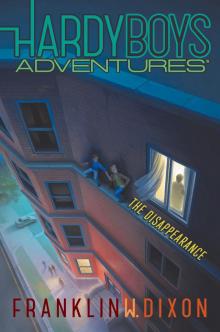 The Disappearance
The Disappearance Sea Life Secrets
Sea Life Secrets The Mystery of the Chinese Junk
The Mystery of the Chinese Junk A Skateboard Cat-astrophe
A Skateboard Cat-astrophe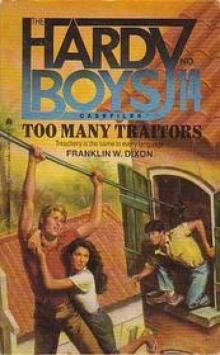 Too Many Traitors
Too Many Traitors Galaxy X
Galaxy X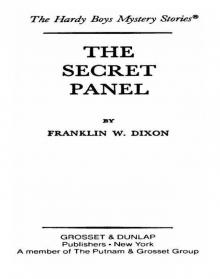 The Secret Panel
The Secret Panel The Secret of Wildcat Swamp
The Secret of Wildcat Swamp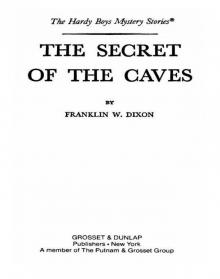 The Secret of the Caves
The Secret of the Caves The Caribbean Cruise Caper
The Caribbean Cruise Caper Without a Trace
Without a Trace The Mystery of the Spiral Bridge
The Mystery of the Spiral Bridge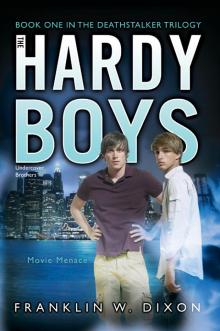 Movie Menace
Movie Menace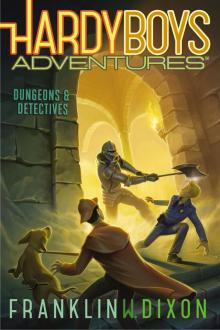 Dungeons & Detectives
Dungeons & Detectives Water-Ski Wipeout
Water-Ski Wipeout The Case of the Psychic's Vision
The Case of the Psychic's Vision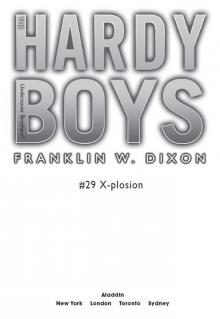 X-plosion
X-plosion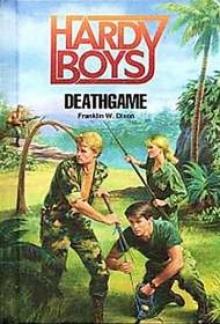 Deathgame
Deathgame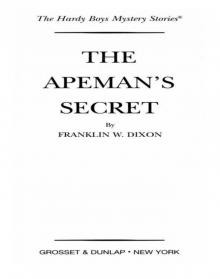 The Apeman's Secret
The Apeman's Secret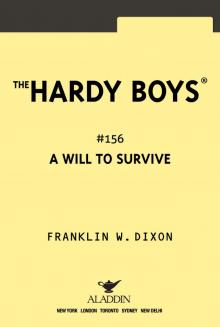 A Will to Survive
A Will to Survive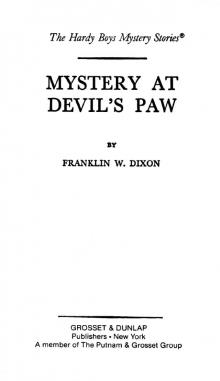 Mystery at Devil's Paw
Mystery at Devil's Paw Blood Money
Blood Money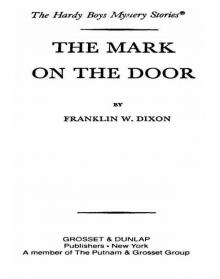 The Mark on the Door
The Mark on the Door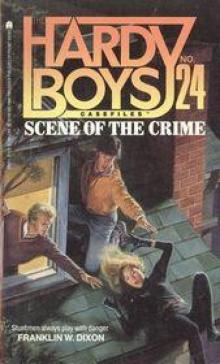 Scene of the Crime
Scene of the Crime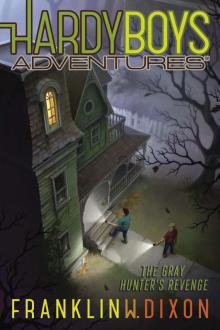 The Gray Hunter's Revenge
The Gray Hunter's Revenge Stolen Identity
Stolen Identity The Mummy's Curse
The Mummy's Curse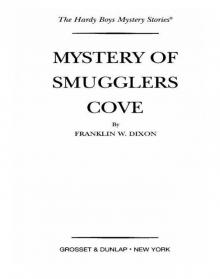 Mystery of Smugglers Cove
Mystery of Smugglers Cove Diplomatic Deceit
Diplomatic Deceit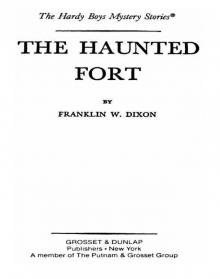 The Haunted Fort
The Haunted Fort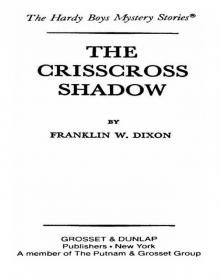 The Crisscross Shadow
The Crisscross Shadow Secret of the Red Arrow
Secret of the Red Arrow Trial and Terror
Trial and Terror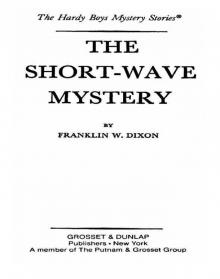 The Short-Wave Mystery
The Short-Wave Mystery The Spy That Never Lies
The Spy That Never Lies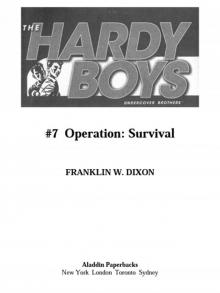 Operation: Survival
Operation: Survival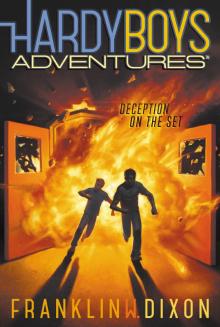 Deception on the Set
Deception on the Set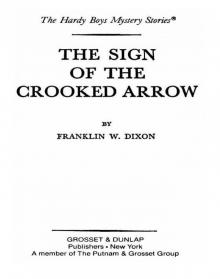 The Sign of the Crooked Arrow
The Sign of the Crooked Arrow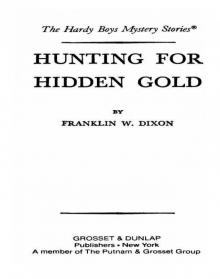 Hunting for Hidden Gold
Hunting for Hidden Gold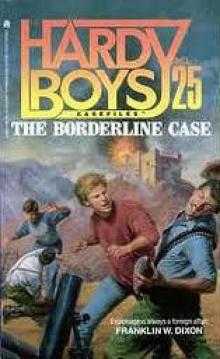 Disaster for Hire
Disaster for Hire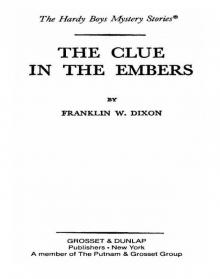 The Clue in the Embers
The Clue in the Embers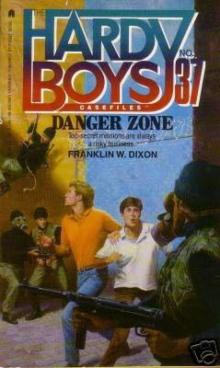 Danger Zone
Danger Zone The Hidden Harbor Mystery
The Hidden Harbor Mystery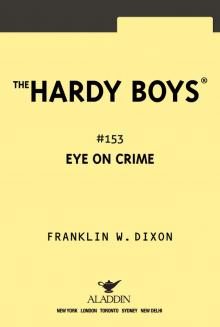 Eye on Crime
Eye on Crime A Game Called Chaos
A Game Called Chaos The Bicycle Thief
The Bicycle Thief The Missing Playbook
The Missing Playbook Survival Run
Survival Run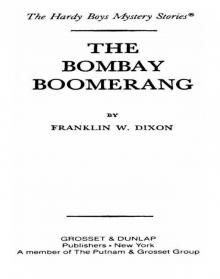 The Bombay Boomerang
The Bombay Boomerang Mystery of the Samurai Sword
Mystery of the Samurai Sword Burned
Burned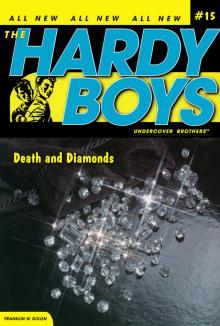 Death and Diamonds
Death and Diamonds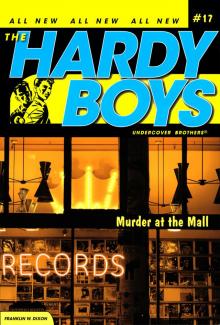 Murder at the Mall
Murder at the Mall The Prime-Time Crime
The Prime-Time Crime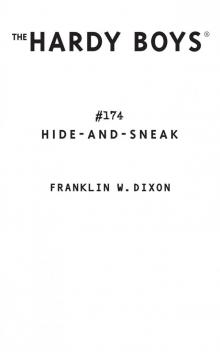 Hide-and-Sneak
Hide-and-Sneak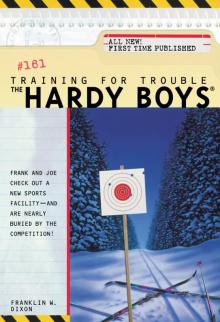 Training for Trouble
Training for Trouble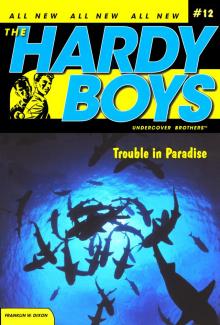 Trouble in Paradise
Trouble in Paradise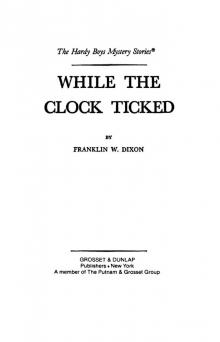 While the Clock Ticked
While the Clock Ticked The Alaskan Adventure
The Alaskan Adventure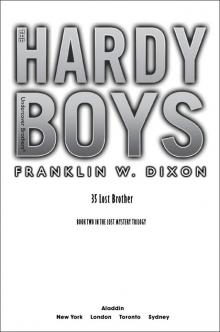 The Lost Brother
The Lost Brother Tunnel of Secrets
Tunnel of Secrets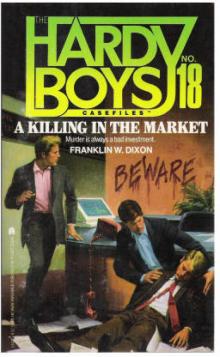 A Killing in the Market
A Killing in the Market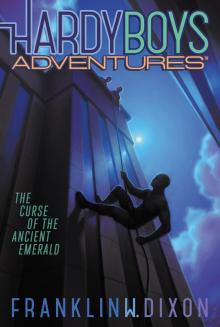 The Curse of the Ancient Emerald
The Curse of the Ancient Emerald The Arctic Patrol Mystery
The Arctic Patrol Mystery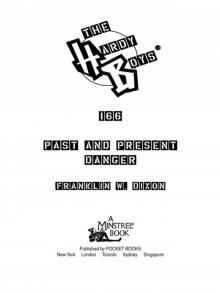 Past and Present Danger
Past and Present Danger The Castle Conundrum (Hardy Boys)
The Castle Conundrum (Hardy Boys) Farming Fear
Farming Fear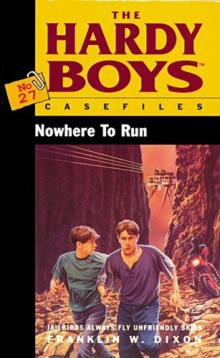 Nowhere to Run
Nowhere to Run The Secret of the Soldier's Gold
The Secret of the Soldier's Gold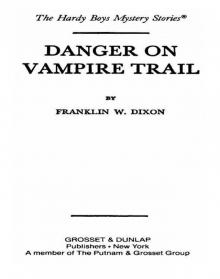 Danger on Vampire Trail
Danger on Vampire Trail The Lure of the Italian Treasure
The Lure of the Italian Treasure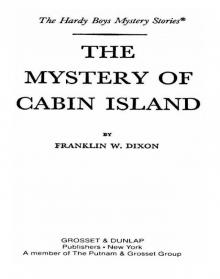 The Mystery of Cabin Island
The Mystery of Cabin Island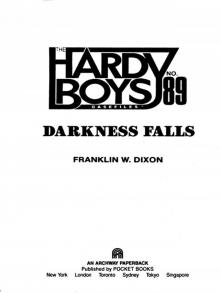 Darkness Falls
Darkness Falls Night of the Werewolf
Night of the Werewolf Danger in the Extreme
Danger in the Extreme The Lazarus Plot
The Lazarus Plot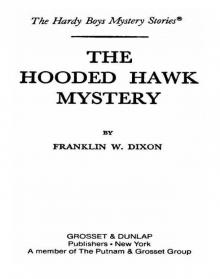 The Hooded Hawk Mystery
The Hooded Hawk Mystery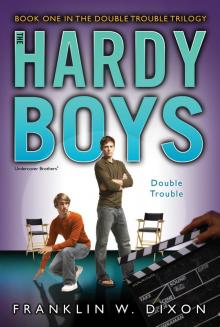 Double Trouble
Double Trouble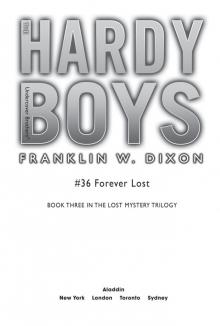 Forever Lost
Forever Lost Pushed
Pushed The Great Airport Mystery
The Great Airport Mystery The Hunt for Four Brothers
The Hunt for Four Brothers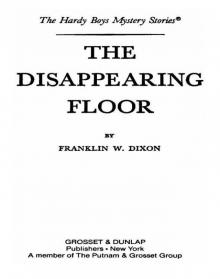 The Disappearing Floor
The Disappearing Floor Motocross Madness
Motocross Madness Foul Play
Foul Play High-Speed Showdown
High-Speed Showdown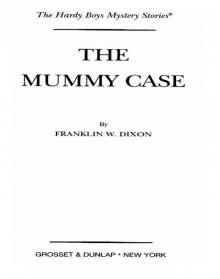 The Mummy Case
The Mummy Case The Firebird Rocket
The Firebird Rocket Trouble in Warp Space
Trouble in Warp Space Ship of Secrets
Ship of Secrets Line of Fire
Line of Fire The Clue of the Broken Blade
The Clue of the Broken Blade Medieval Upheaval
Medieval Upheaval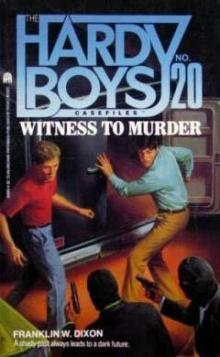 Witness to Murder
Witness to Murder The Giant Rat of Sumatra
The Giant Rat of Sumatra Attack of the Bayport Beast
Attack of the Bayport Beast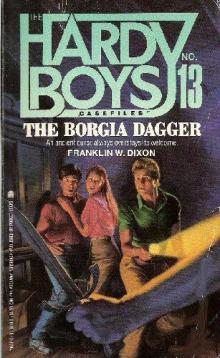 The Borgia Dagger
The Borgia Dagger Scavenger Hunt Heist
Scavenger Hunt Heist No Way Out
No Way Out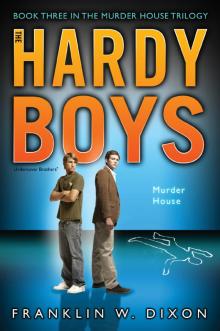 Murder House
Murder House The X-Factor
The X-Factor The Desert Thieves
The Desert Thieves Mystery of the Phantom Heist
Mystery of the Phantom Heist The Battle of Bayport
The Battle of Bayport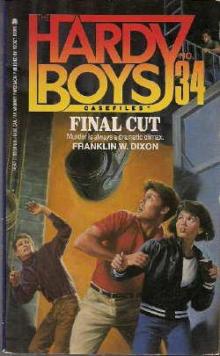 Final Cut
Final Cut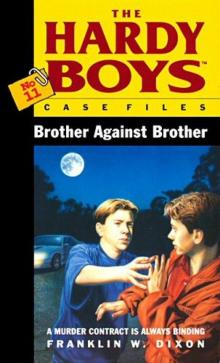 Brother Against Brother
Brother Against Brother Private Killer
Private Killer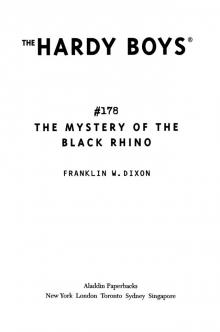 The Mystery of the Black Rhino
The Mystery of the Black Rhino Feeding Frenzy
Feeding Frenzy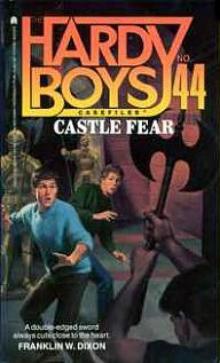 Castle Fear
Castle Fear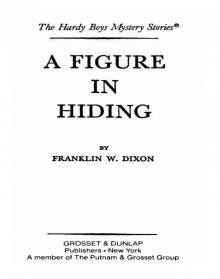 A Figure in Hiding
A Figure in Hiding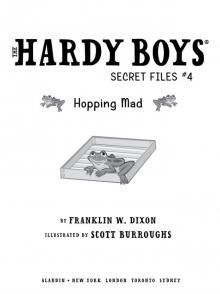 Hopping Mad
Hopping Mad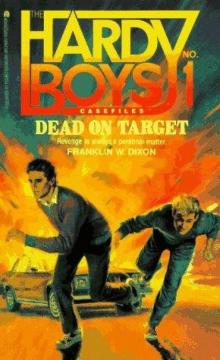 Dead on Target
Dead on Target Skin and Bones
Skin and Bones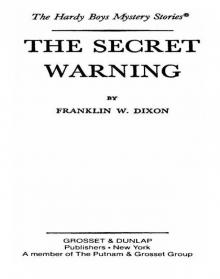 The Secret Warning
The Secret Warning Flesh and Blood
Flesh and Blood The Shattered Helmet
The Shattered Helmet Boardwalk Bust
Boardwalk Bust Terror at High Tide
Terror at High Tide In Plane Sight
In Plane Sight The London Deception
The London Deception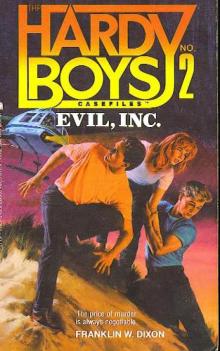 Evil, Inc.
Evil, Inc.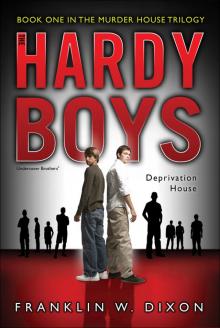 Deprivation House
Deprivation House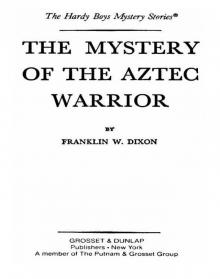 The Mystery of the Aztec Warrior
The Mystery of the Aztec Warrior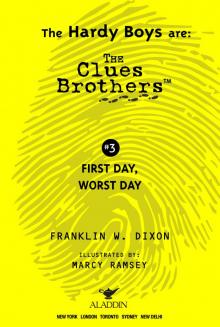 First Day, Worst Day
First Day, Worst Day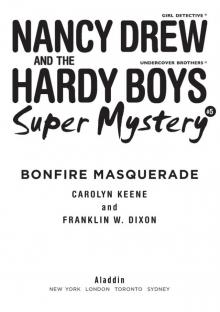 Bonfire Masquerade
Bonfire Masquerade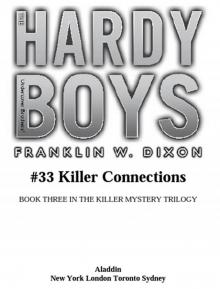 Killer Connections
Killer Connections Strategic Moves
Strategic Moves Warehouse Rumble
Warehouse Rumble The Chase for the Mystery Twister
The Chase for the Mystery Twister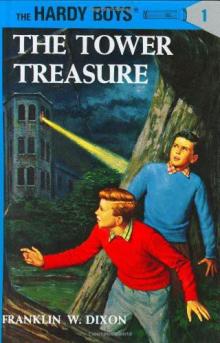 The Tower Treasure thb-1
The Tower Treasure thb-1 The Children of the Lost
The Children of the Lost The Last Laugh
The Last Laugh Trick-or-Trouble
Trick-or-Trouble Perfect Getaway
Perfect Getaway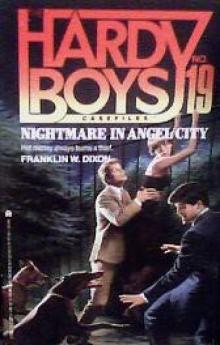 Nightmare in Angel City
Nightmare in Angel City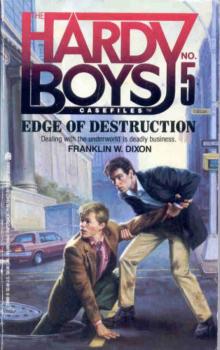 Edge of Destruction
Edge of Destruction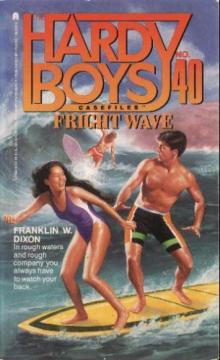 Fright Wave
Fright Wave The Jungle Pyramid
The Jungle Pyramid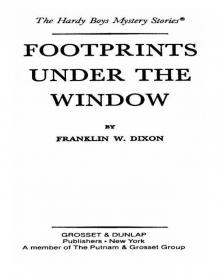 Footprints Under the Window
Footprints Under the Window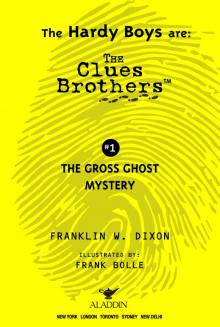 The Gross Ghost Mystery
The Gross Ghost Mystery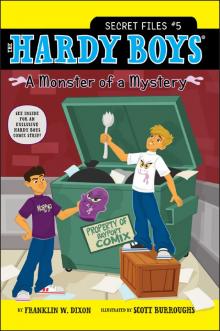 A Monster of a Mystery
A Monster of a Mystery House Arrest
House Arrest Mystery of the Desert Giant
Mystery of the Desert Giant Talent Show Tricks
Talent Show Tricks The Sting of the Scorpion
The Sting of the Scorpion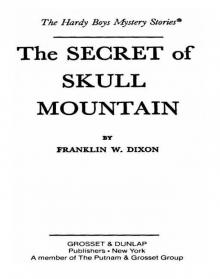 The Secret of Skull Mountain
The Secret of Skull Mountain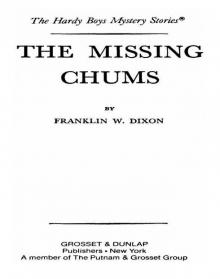 The Missing Chums
The Missing Chums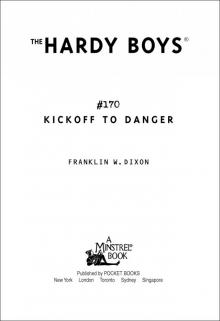 Kickoff to Danger
Kickoff to Danger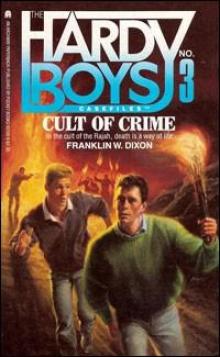 Cult of Crime
Cult of Crime Running on Fumes
Running on Fumes Martial Law
Martial Law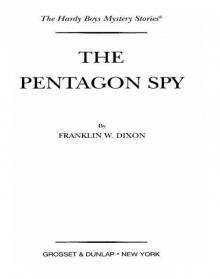 The Pentagon Spy
The Pentagon Spy Hazed
Hazed The Secret Agent on Flight 101
The Secret Agent on Flight 101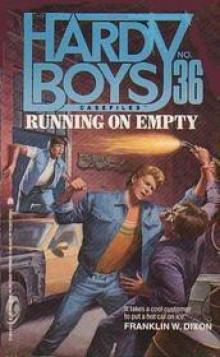 Running on Empty
Running on Empty Top Ten Ways to Die
Top Ten Ways to Die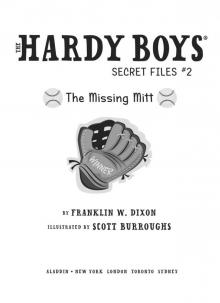 The Missing Mitt
The Missing Mitt The Melted Coins
The Melted Coins The Rocky Road to Revenge
The Rocky Road to Revenge The Masked Monkey
The Masked Monkey Lost in Gator Swamp
Lost in Gator Swamp Extreme Danger
Extreme Danger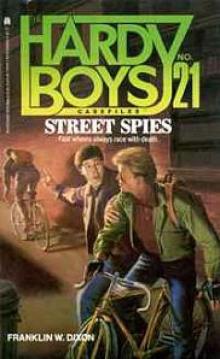 Street Spies
Street Spies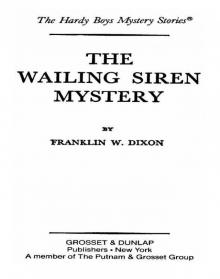 The Wailing Siren Mystery
The Wailing Siren Mystery The Dangerous Transmission
The Dangerous Transmission Hurricane Joe
Hurricane Joe The Crisscross Crime
The Crisscross Crime Mystery of the Whale Tattoo
Mystery of the Whale Tattoo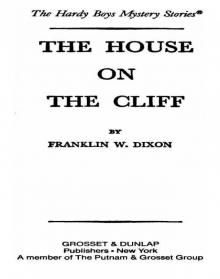 The House on the Cliff
The House on the Cliff Camping Chaos
Camping Chaos Ghost of a Chance
Ghost of a Chance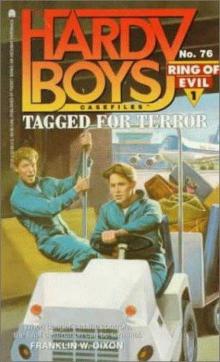 Tagged for Terror
Tagged for Terror Thrill Ride
Thrill Ride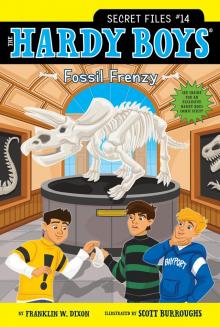 Fossil Frenzy
Fossil Frenzy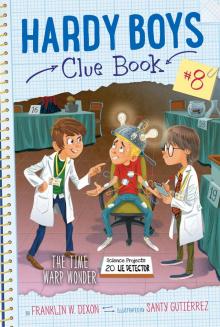 The Time Warp Wonder
The Time Warp Wonder Ghost Stories
Ghost Stories Speed Times Five
Speed Times Five What Happened at Midnight
What Happened at Midnight Three-Ring Terror
Three-Ring Terror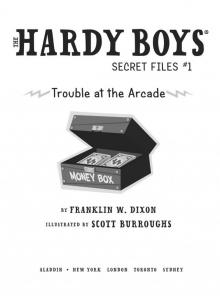 Trouble at the Arcade
Trouble at the Arcade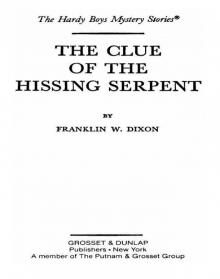 The Clue of the Hissing Serpent
The Clue of the Hissing Serpent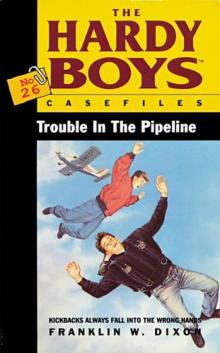 Trouble in the Pipeline
Trouble in the Pipeline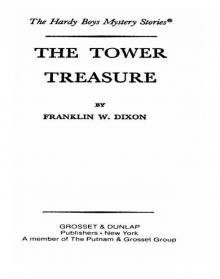 The Tower Treasure
The Tower Treasure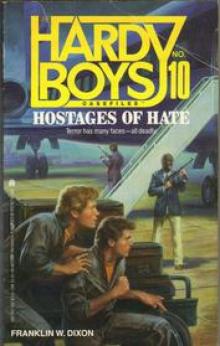 Hostages of Hate
Hostages of Hate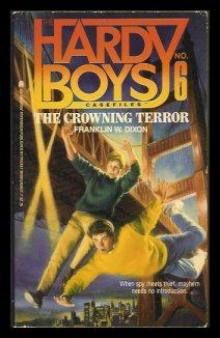 The Crowning Terror
The Crowning Terror Daredevils
Daredevils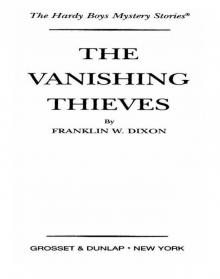 The Vanishing Thieves
The Vanishing Thieves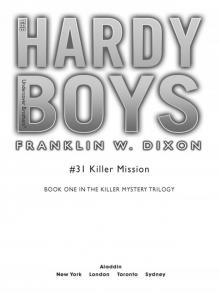 Killer Mission
Killer Mission The Mark of the Blue Tattoo
The Mark of the Blue Tattoo The Witchmaster's Key
The Witchmaster's Key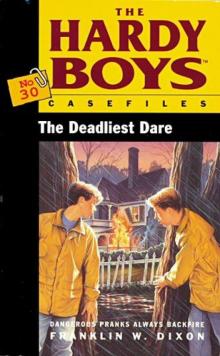 The Deadliest Dare
The Deadliest Dare Peril at Granite Peak
Peril at Granite Peak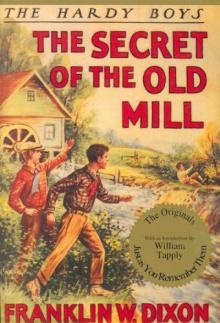 The Secret Of The Old Mill thb-3
The Secret Of The Old Mill thb-3 Rocky Road
Rocky Road The Demolition Mission
The Demolition Mission Blown Away
Blown Away Passport to Danger
Passport to Danger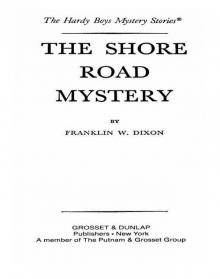 The Shore Road Mystery
The Shore Road Mystery Trouble Times Two
Trouble Times Two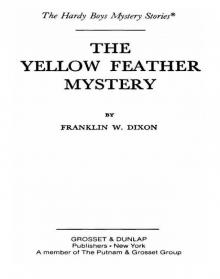 The Yellow Feather Mystery
The Yellow Feather Mystery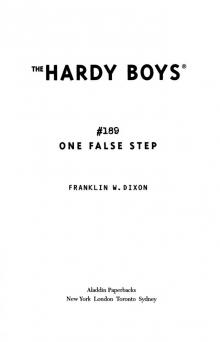 One False Step
One False Step Crime in the Cards
Crime in the Cards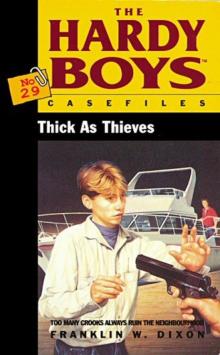 Thick as Thieves
Thick as Thieves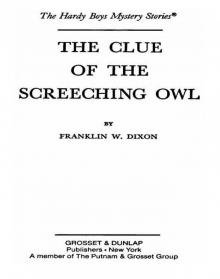 The Clue of the Screeching Owl
The Clue of the Screeching Owl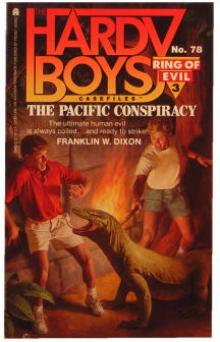 The Pacific Conspiracy
The Pacific Conspiracy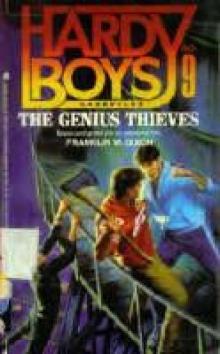 The Genius Thieves
The Genius Thieves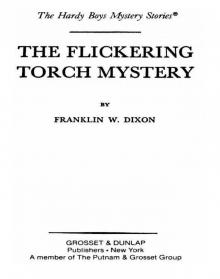 The Flickering Torch Mystery
The Flickering Torch Mystery Into Thin Air
Into Thin Air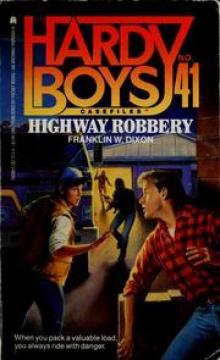 Highway Robbery
Highway Robbery Deadfall
Deadfall Mystery of the Flying Express
Mystery of the Flying Express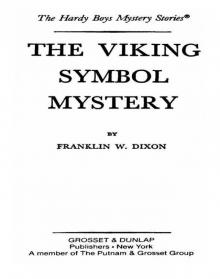 The Viking Symbol Mystery
The Viking Symbol Mystery The End of the Trail
The End of the Trail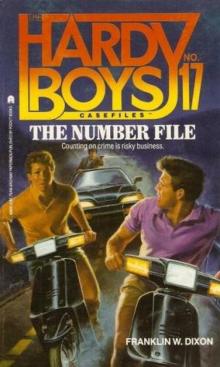 The Number File
The Number File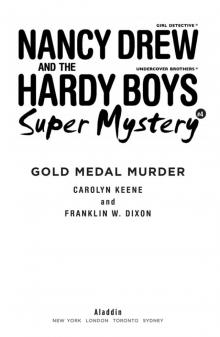 Gold Medal Murder
Gold Medal Murder Bound for Danger
Bound for Danger Collision Course
Collision Course The Madman of Black Bear Mountain
The Madman of Black Bear Mountain The Secret of the Lost Tunnel
The Secret of the Lost Tunnel The Stone Idol
The Stone Idol The Secret of Pirates' Hill
The Secret of Pirates' Hill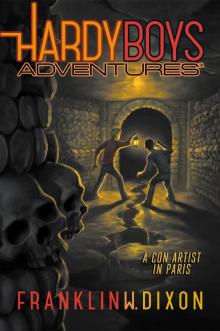 A Con Artist in Paris
A Con Artist in Paris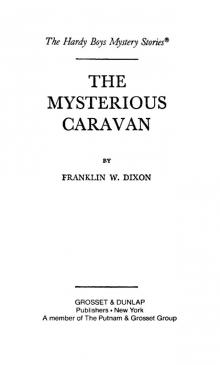 The Mysterious Caravan
The Mysterious Caravan The Secret of Sigma Seven
The Secret of Sigma Seven The Twisted Claw
The Twisted Claw The Phantom Freighter
The Phantom Freighter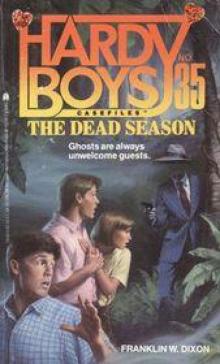 The Dead Season
The Dead Season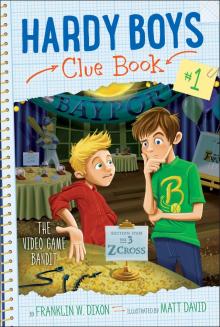 The Video Game Bandit
The Video Game Bandit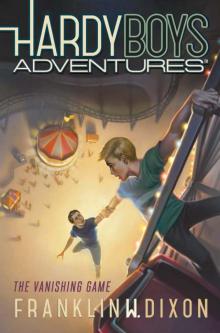 The Vanishing Game
The Vanishing Game Typhoon Island
Typhoon Island